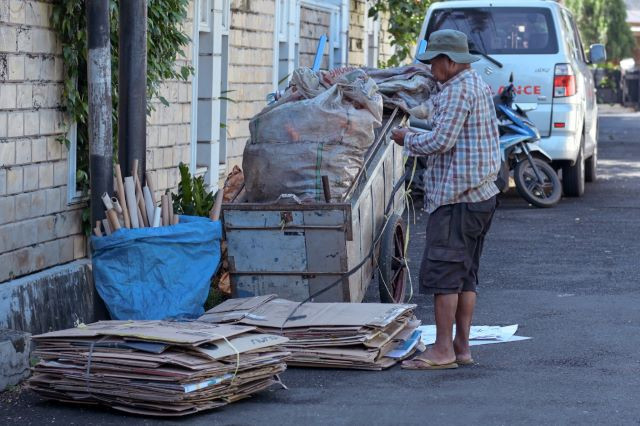Popular Reads
Top Results
Can't find what you're looking for?
View all search resultsPopular Reads
Top Results
Can't find what you're looking for?
View all search resultsLess poverty but little relief
Change text size
Gift Premium Articles
to Anyone
T
he drop in Indonesia’s poverty rate to yet another historic low should be cause for celebration, but nobody feels in the mood.
The latest biannual report, published last month, shows the rate of poor people dropping from 8.57 percent of the population in September 2024 to 8.47 percent in March 2025, with the absolute number of poor down by some 210,000 at 23.85 million.
The government deserves credit for bringing down the number of people living in extreme poverty, which is what the Statistics Indonesia (BPS) poverty data logs.
Ten years ago, the rate was above 11 percent. What we have now is the lowest rate since BPS began logging the indicator in 1960, and the drop comes despite the government lifting the poverty line by 2.34 percent for the latest survey.
Any government should aim to push to zero the poverty rate by ensuring that every person, regardless of their capacity to earn a living by themselves, has access to enough food and shelter to survive.
We are getting closer at least, if ever so slowly, and social aid has played a massive role in that effort under both the current and previous administrations.
There is nothing wrong with that, per se, because eliminating abject poverty is a humanitarian rather than economic goal, and where the economy fails to ensure its achievement, social security must come to the rescue.
Yet it is not ideal. It is akin to giving a poor man a fish instead of giving him a fishing rod and teaching him how to use it, so he can make a living for himself.
The poverty figure says little about the overall state of the economy, or about how safe people are financially and what prospects, or fishing rods, they have to achieve a higher standard of living.
The need for state handouts should be kept to a minimum, not just because social aid is a burden on the budget, but also because most people would prefer to sustain themselves.
The recent increase in mass layoffs in the formal sector, particularly in labor-intensive industries, is concerning in that regard, as more people slip into a precarious living in the informal sector.
Usually, the loss of a job will not immediately land people below the poverty line, but it will in many cases cause sleepless nights, and anxious glances across family dining tables.
The growing number of Indonesians reportedly indulging in window shopping, instead of the real thing, reflects wariness about the future even among the country’s middle class, which has been shrinking lately.
Ideally, their spending would translate into formal employment for the vastly larger population in what is euphemistically called the aspiring middle class.
Where social aid is necessary for short-term relief, whether in the form of cash, food or electricity discounts, is must be properly targeted.
Unfortunately, many who need it, do not get it, and many who get it, do not need it. While that is almost inevitable in our vast country’s enormous shadow economy, the government must do its utmost to identify those in need and minimize abuse and corruption in social aid.
The free meals program, a flagship policy of the Prabowo Subianto administration, has its own merits when it comes to targeted poverty alleviation, as its benefits will be appreciated the most by those who truly need it, and less by those who are used to buying fancier food themselves.
The ultimate way to tackle poverty, however, is through growing investment and consumption, and state resources should go to facilitating such economic activity first and foremost, with social aid being just the last line of defense.
The recently reported decline in foreign direct investment (FDI), a vital source of private-sector led formal economic activity, is hardly encouraging in this regard.
We must encourage more investment in future-proof industries to provide reliable employment at all levels of qualification.
Or else those who have climbed out of poverty will live with the fear of falling back in.











